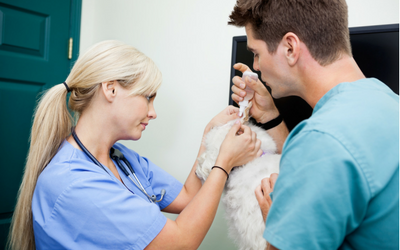
October marks Veterinary Technician Appreciation Month, a time to celebrate the profession and the role that technicians play in veterinary medicine. Also referred to as veterinary nurses, technicians play a significant role in veterinary practices everywhere and without them, practices would not function as they do today.
Veterinary technicians undergo a rigorous college education in animal care and handling, laboratory testing, radiography, surgical and anesthetic procedures, pharmacy, nursing care, and many other healthcare procedures and practices. Think of all the people involved in your own healthcare before and after you see your physician – veterinary technicians fill many of those shoes!
Here are just some of the tasks they perform on a typical – or not so typical – day!
- Admitting patients for procedures such as dentistry and surgery, making sure the patient has fasted, drawing samples and running pre-anesthetic bloodwork, and preparing the pet for the procedure (e.g., clipping and cleaning the surgical site)
- Administering anesthetics
- Preparing the dental/surgical suite with the necessary instrumentation
- Ensuring the proper sterilization of dental and surgical instruments
- Performing dental hygiene procedures and assisting with surgical procedures
- Monitoring vital signs (e.g., ECG, blood pressure, respiration, oxygen levels, etc.) during anesthesia
- Providing specialized nursing care after procedures and for critically ill patients
- Cleaning wounds and applying bandages and dressings
- Veterinary technicians are often the first point of contact with pet owners during wellness check-ups and appointments for medical issues where they collect a patient’s medical history
- Performing certain procedures such as ear cleanings and nail trims
- Checking the patient’s vital signs and collecting blood, urine, or fecal samples
- Following collection, performing laboratory analyses (tests) on the samples
- Positioning patients for X-rays and ultrasounds, keeping them calm and comfortable
- Medicating and monitoring hospitalized patients
- Educating pet owners on pet health care, including preventive care (e.g., vaccines, flea and tick preventives), nutrition, medications, and special needs as it relates to procedures, surgery, or illness
- Providing food, water, exercise, and “bathroom breaks” to hospitalized pets
- Following-up to see how a patient is doing a day or two after discharge
- Ordering supplies and maintaining the pharmacy inventory
- Participating in continuing education to maintain certifications
- In smaller practices, veterinary technicians can provide practice management and administrative support as well!
Veterinary technicians are highly skilled members of your veterinary healthcare team! They are extremely dedicated to the work they do. Their work requires physical, mental, and emotional strength. This month, pop by your veterinary hospital to say a big “Thank you!” to the veterinary technicians that spend their days caring for the pets in your community.